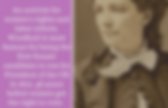

Who is Olga Ladyzhenskaya? Four things you didn't know about the influential mathematician. Russian mathematician Olga Ladyzhenskaya left behind an influential body of work, which continues to impact fields such as weather forecasting to this day.

For that reason, Google Doodle has commissioned a special artwork paying tribute to her life and legacy on Thursday, marking what would have been her 97th birthday. Born in Kologriv, Soviet Russia on 7 March 1922, Ladyzhenskaya overcame both personal and political obstacles throughout her career, which saw her author more than 250 papers. We’ll tell you what’s true. You can form your own view. When a white conductor tried to manhandle Ida B. Wells, she took a bite out of his hand. Who Is Maggie Kuhn? (w/ Eric Kingson) - The Washington Post. The 1996 Article Every Millennial Should Read – Savannah L. Barker.
The question as to why many Millennials —and millennial feminists in particular— seem to have turned their backs on Hillary Clinton has been explored at length this primary season.
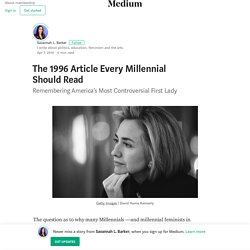
The Daily Beast, Huffington Post, and Los Angeles Times have all come to varying conclusions: Hillary is “not feminist enough,” Hillary is “part of the establishment,” and Bernie’s youthful idealism is more appealing than Hillary’s less sexy pragmatism. All of these factors undoubtedly play a large role in the overall negative perception some Millennials have of Hillary Clinton, but the more obvious answer is simply this: we Millennials are coming to know Hillary Clinton after 20 years of relentless personal and political attacks. Whatever you may think of her, you cannot deny that no other public figure has been subjected to the kind of merciless scrutiny that Hillary Clinton has endured throughout her career. Those of us born after 1980 don’t remember First Lady Hillary Clinton.
These 6 pioneering women helped create modern computers click 2x. University of Pennsylvania Archives When I was a college student in the mid-1980s, I discovered something important about myself: I loved to program and I loved programming projects.
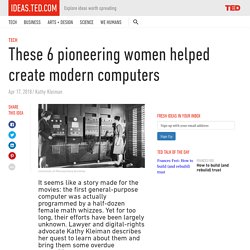
But there was one problem. Powerfully delivered half a century ago, Shirley Chisholm’s words couldn’t be more relevant today. Hookers Ball, strippers, dancers, and activists took over San Francisco click 2x. Indian woman fled colonial rule, only to fight oppression in U.S. click 2x. Female Aviation Pioneer Fought for Pilots of Color. Smithsonian Institution In addition to flying, Janet Bragg was a registered nurse, business entrepreneur and active in civic organizations.

While Amelia Earhart is known as a pioneer among female pilots, African American women were also breaking ground in the early days of aviation, often overcoming great adversity and discrimination to do so. Air show pilot Bessie Coleman was the first African American woman to receive a pilot's license and Janet Bragg was the first to earn a commercial pilot's license.
Additionally, Bragg's leadership in black pilot organizations paved the way for other aviators of color. Born in 1907, Bragg enrolled in the Curtiss Wright Aeronautical School in 1933, where she was the only woman in the aircraft mechanics class. Sophie Scholl was beheaded at 21 for standing up to the Nazis. This fearless Mexican American reporter fought racism and sexism to keep power in check. Happy birthday, Susan B. Anthony - Historical Snapshots click 2x. Annette Kellerman, the first woman to wear a one-piece swimsuit - Historical Snapshots. Martha Hughes Cannon. Martha Maria "Mattie" Hughes Cannon (July 1, 1857 – July 10, 1932) was a Welsh-born immigrant to the United States, a polygamous wife, physician, Utah women's rights advocate and suffragist, and Utah State Senator.
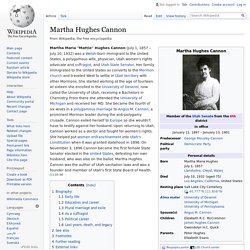
Her family immigrated to the United States as converts to the Mormon church and traveled West to settle in Utah territory with other Mormons. She started working at the age of fourteen. At sixteen she enrolled in the University of Deseret, now called the University of Utah, receiving a Bachelors in Chemistry. From there she attended the University of Michigan and received her MD. Helen Keller. Helen Adams Keller (June 27, 1880 – June 1, 1968) was an American author, political activist, and lecturer.
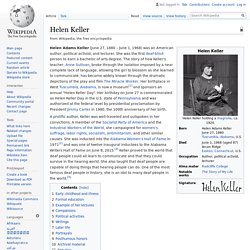
She was the first deaf-blind person to earn a bachelor of arts degree. The story of how Keller's teacher, Anne Sullivan, broke through the isolation imposed by a near complete lack of language, allowing the girl to blossom as she learned to communicate, has become widely known through the dramatic depictions of the play and film The Miracle Worker. Her birthplace in West Tuscumbia, Alabama, is now a museum[1] and sponsors an annual "Helen Keller Day".
Irena Sendler, the woman who helped save 2,500 children from the Holocaust. “I give my child in your care, raise my child as if it were yours.”
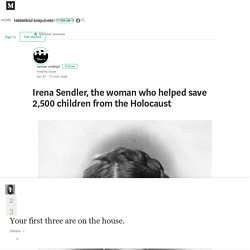
These words were written by the mother of a six year old Jewish girl Rami, who was smuggled out of the Jewish ghetto in Nazi occupied Warsaw, Poland, during the Second World War. Little Rami was placed into foster care with her mother’s Polish friends on the Aryan side of the city and, unlike her mother, ultimately survived the war. The person who was instrumental in making Rami’s survival possible was a woman named Irena Sendler, a social worker and Polish resistance operative who helped save 2,500 Jewish children like Rami during the Holocaust.
First woman to run for president. Remembering Liu Xiaobo, Who Fought For Human Rights In China. A man mourns late Chinese Nobel Peace laureate Liu Xiaobo outside the Chinese liaison office in Hong Kong.
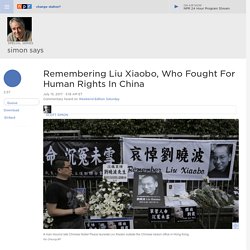
Kin Cheung/AP hide caption toggle caption Kin Cheung/AP. 164 years ago, a former slave rocked the world with these words. Actress Alfre Woodard performs a very moving piece from abolitionist, women's rights proponent, and former slave Sojourner Truth that was originally delivered in 1851.
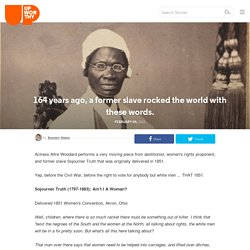
Yep, before the Civil War, before the right to vote for anybody but white men ... THAT 1851. Sojourner Truth (1797-1883): Ain't I A Woman? Delivered 1851 Women's Convention, Akron, Ohio. Writing and Being Albert Einstein. “”Imagination is more important than knowledge.” — Albert Einstein What would happen if a professional athlete stopped training for an event because they were tired of their sport?

If he or she made a habit of not training, they’d lose their next event. What would happen if an engineer stopped working on a construction project because he didn’t feel excited about plans for the project? He’d lose his job. HISTORY: Mary Bowser Worked as Servant in Confederate White House to Spy on Jefferson Davis for Union Army. Union Army Spy and Hero Mary Bowser For Women’s History Month, The Root is spotlighting less famous figures from the African American National Biography, whose stories exemplify the extraordinary, and often unsung, accomplishments of African-American women from our past.
In modern wars, including the Civil War, women have taken on key assignments at the heart of the action as soldiers or nurses or performed supportive roles. Women contributed important work to the intelligence services of the Union as well as the Confederacy: Perhaps the most remarkable service rendered was that of Harriet Tubman, now recognized as having played a central role in gathering intelligence and planning the liberation of more than 700 slaves in the Union Army’s dramatic 1863 raid on the Confederate redoubt at the Combahee River in South Carolina. Other black women are known to have served the Union cause as spies, but because of the very subterfuge involved, biographical detail about them is hard to pin down.
It's Fred Korematsu Day: Celebrating A Foe Of U.S. Internment Camps. Fred Korematsu, whose fight against internment led all the way to the Supreme Court — and who later warned of acting against groups due to their race or religion — is being honored by several states today. He died in 2005. Robin Weiner/AP hide caption toggle caption Robin Weiner/AP Fred Korematsu, whose fight against internment led all the way to the Supreme Court — and who later warned of acting against groups due to their race or religion — is being honored by several states today. Remembering the African-American Suffragists Who Fought a Dual Oppression. “I feel that I have the right to have just as much as a man. There is a great stir about colored men getting their rights, but not a word about the colored women; and if colored men get their rights and colored women not theirs, the colored men will be masters over the women, and it will be just as bad as it was before,” the abolitionist Sojourner Truth said in 1867.
I am thinking about Truth, and so many other African-American female freedom fighters, because of the imminent release of the film Suffragette, starring Carey Mulligan. If that movie chronicles the struggle for the vote in Britain, it also brings to mind our own suffrage story. Martin Luther King Jr.: Remembering a Committed Life. This Martin Luther King Jr. day, we remember the civil rights leader with this essay from Gary May, who wrote the book, Bending toward Justice: The Voting Rights Act and the Transformation of American Democracy.
May appeared on Moyers & Company this past July to discuss his book and the agonizing but ultimately victorious struggle to pass the 1965 voting rights legislation — which he described to Bill as “a perfect example of the value of collective change to bring about progress in this country, people getting together and being committed and willing to risk their very lives to bring something when the country desperately needs it.” The Rev. Ralph Abernathy, right, and Bishop Julian Smith, left, flank Dr. The legend that was Mary Fields – historical snapshots – Medium. Harriet Tubman - Black History. In 1849 Tubman fled Maryland, leaving behind her free husband of five years, John Tubman, and her parents, sisters, and brothers.
“Mah people mus’ go free,” her constant refrain, suggests a determination uncommon among even the most militant slaves. She returned to the South at least nineteen times to lead her family and hundreds of other slaves to freedom via the Underground Railroad. Exploring the Life of Nikola Tesla. Boudica: The Warrior Queen Who Challenged Rome.
Sister Mary Kenneth Keller – The First Woman to Earn a PhD in Computer Science - History Hole. Louis Armstrong plays the trumpet for his wife in front of the Sphinx and pyramids in Giza, 1961. Before Rosa Parks, A Teenager Defied Segregation On An Alabama Bus : Code Switch. Episode 1. Ian McKellen on Edmund Hillary. Gertrude Berg: The Original Media Titan. Grace Hopper. Witold Pilecki – historical snapshots – Medium. 'Hidden Figures': How Black Women Did The Math That Put Men On The Moon. John Scopes. Maria Helen Alvarez – historical snapshots. Clint Hill – historical photo as he tries to protect Kennedy. Noor Inayat Khan – historical snapshots – Medium. Kazuo Otani – historical snapshots – Medium.
Black Motorcycle Queen of 1930s. Pancho Barnes – historical snapshots – Medium. Sophie Scholl – historical snapshots – Medium. Ola Mildred Rexroat – historical snapshots – Medium.